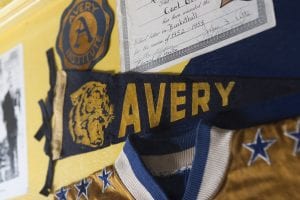Avery Research Center continues legacy of educational excellence
February 25, 2021Walter G. Brown Jr. is someone who benefitted from an Avery Normal Institute education. Brown contracted polio as a young boy, and when he started school his teachers mollycoddled him. As a result, Brown didn’t apply himself. Fortunately, Ms. Mary Fraser, a retired educator and his family’s landlord, offered to homeschool him.
“She rang a bell at the start of school and then again at lunch,” chuckles Brown. “Whenever I heard the bell, I knew it was time to go downstairs for class.”
From kindergarten through second grade, Brown was homeschooled. Then Fraser informed his parents that it was time for him to go to the Avery Normal Institute located on Bull Street in downtown Charleston. For his family, having Brown attend the private school was a sacrifice, but one they considered an important investment.
Brown attended the Avery Normal Institute until he graduated in 1951. To this day he remembers the many educators who influenced him — D. Jack Moses in the music department; John F. Potts, the principal and a member of the Omega Phi Psi fraternity that Brown later joined; Alphonso W. Hoursey who created Hi-Y, a program to teach male students social graces; and Luther Bligen who coached the football and basketball teams to success.
Brown’s education, which included the Classics, was designed to prepare him for college, which the majority of his classmates attended. He received financial assistance to attend South Carolina State College, and his Avery education gave him the foundation to succeed as an education major.
“I found that my freshman year of college was a repeat of my senior year at Avery, especially biology and chemistry,” says Brown. “It was the exact same format.”
Brown realized he had responsibilities to live up to Avery’s high standards. When he met, but did not exceed expectations at college, he recalls a professor saying, “You attended Avery. You are better than this.”
Brown went on to be a successful educator and community leader. Unfortunately, his graduating class at the Avery was among the last. In 1954, the 89-year-old institution closed its doors.
In collaboration with the College of Charleston, the Avery Research Center for African American History and Culture opened in 1985 in the original Avery Normal Institute buildings. Today, the Avery Research Center collects and preserves archival materials, and raises awareness about African Americans in the Lowcountry and beyond through instruction and public programming.
As a member of the Avery Institute Board, which governs the Avery Institute of Afro-American History and Culture, a separate nonprofit that provides support to the Avery Research Center’s programs and operations, Brown takes his responsibility as an Avery graduate seriously and keeps the high standards of his alma mater top of mind. He is dedicated to supporting the center’s collection as a way to preserve and promote the unique history and culture of the African diaspora.
And the COVID-19 pandemic has not slowed the Avery Research Center down. Rather than in-person programs, the Avery Research Center’s team has brought education programs to the digital platform. The team created the Avery Digital Classroom with digital lectures, film screenings, book discussions and interactive online trivia. As a partner of the Lowcountry Digital History Initiative, the Avery Research Center features exhibits such as “Hidden Voices: Enslaved Women in the Lowcountry the U.S. South.”
Typically, the Avery Research Center hosts more than 3,000 domestic and international visitors each year. With its online presence, the number of Avery Research Center visitors has grown to more than 5,000.
“I’m very proud of what the Avery Research Center is today,” says Brown. “By sharing the mission and the history of African Americans, we are making a difference.”
The Avery Research Center’s latest virtual program, “We Celebrate Year-Round,” will air at noon on Friday, Feb. 26, 2021, on the Avery Research Center’s Facebook and Instagra














